“Access and adherence to the most accurate information and prevention guidelines is one of the strongest weapons against the spread of coronavirus among our vulnerable communities,” says Lazarus Epae, Assistant Chief, Nareng’e-ewoi Sub-location, Turkana County. “We are grateful to Shalom-SCCRR and the established peace groups for supporting our communities to have access to help, and credible information about the virus.”
And
Ms. Anne N., a resident of Nairobi’s Kibera slum and member of the Shalom Intervention Group, observes,
“In order to live in this environment, it’s almost impossible to avoid interacting. We have to queue to use shared toilets and draw water from common taps. With the high population here, we can’t avoid each other because we have to walk past each other in the narrow lanes. We live in poorly drained environments, poorly ventilated rooms and typically overcrowded dwellings. The characteristics of the slum environment like Kibera are themselves potential exposures to the spread of coronavirus.”
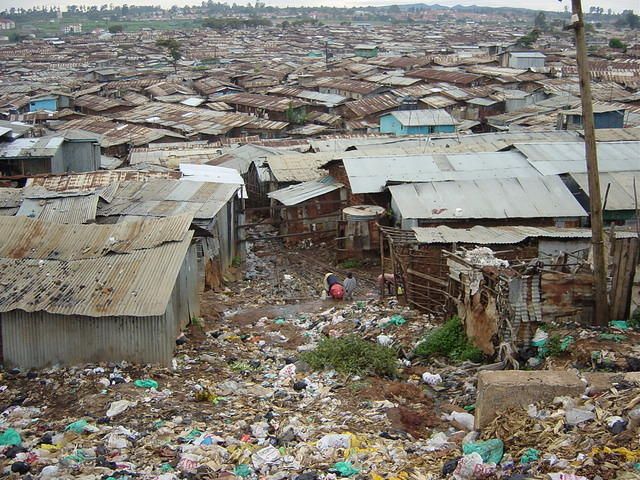
Shalom-SCCRR ongoing pandemic response
Access to information
Shalom-SCCRR has been on the forefront to ensure that communities have access to credible, updated information. Through the SMS platform 22136, Shalom-SCCRR has kept communities in the project areas informed about all that they need to know about the pandemic. These messages have been beneficial to communities in 26 project locations with Shalom-SCCRR group members also engaged in further circulation of these health-related text messages to their community networks.
Further information is disseminated through Shalom-SCCRR’s social media platforms, mainly Facebook and Twitter. Shalom-SCCRR enables community information access through Lead Community Facilitators, who can access social media content and share it with the community and Shalom-SCCRR group members through WhatsApp groups.
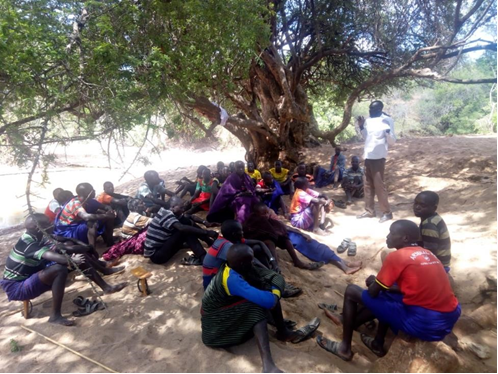
Provision of Personal Protective Equipment (PPE) & supplies
In order to promote protection and hygiene as preventive measures against corona virus, Shalom-SCCRR has taken the initiative of supplying masks and hygiene products such as sanitizers and soap to remote and impoverished areas. This has particularly targeted poverty stricken families, front line health care workers, community health volunteers as well as aid workers. So far, Shalom has supported 27 health facilities (Health centers, clinics and dispensaries) with hygiene and Personal Protective Equipment (PPEs) comprising of body gowns, face shields, face masks, gloves, sanitizers and hand washing soap. Similarly, Shalom has supported 2 orphaned children’s homes in Nairobi and Marsabit counties that were found to be in dire need of these protective and hygiene equipment.
George Lesapicho, group leader for the Shalom-SCCRR peacebuilding group in Arapal, Marsabit County, says, “Communities need Shalom-SCCRR’s peacebuilding and development support now more than ever. The development that we have achieved requires a lot of inter-ethnic cooperation, especially in regions with fragile security and development infrastructure in place. We have confidence in Shalom-SCCRR’s empowerment methodology for our future.”
Women members of Shalom-SCCRR groups have taken the initiative of sewing and distributing free face masks to individuals within their neighborhoods in order to slow the spread of the virus. Individual members of Shalom-SCCRR groups especially in the urban informal settlements, are also involved in manufacturing of home-based hand-washing soap for distribution and use at homes and in public toilets.
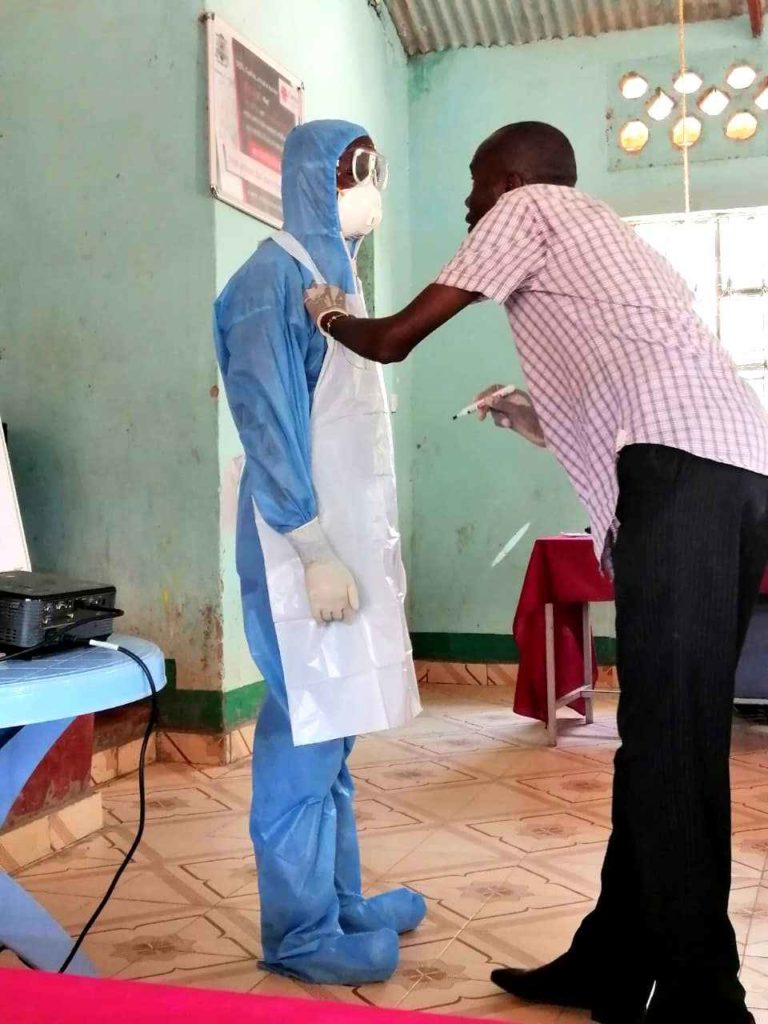
Training Health Care Workers
In recognition of the tremendous role that front line workers play in the fight against COVID-19, Shalom-SCCRR has been involved in training healthcare workers in the Diocese of Lodwar, Turkana County. The training has so far benefitted 50 health workers (Doctors, Clinical Officers, Nurses, Nutritionists, cleaners, and community health volunteers among others) drawn from over 16 health facilities across Turkana County in the Northern Kenya. The training has significantly improved their capacities to respond to the virus by upholding their own safety, that of their contacts and the well-being of the patients while in service.
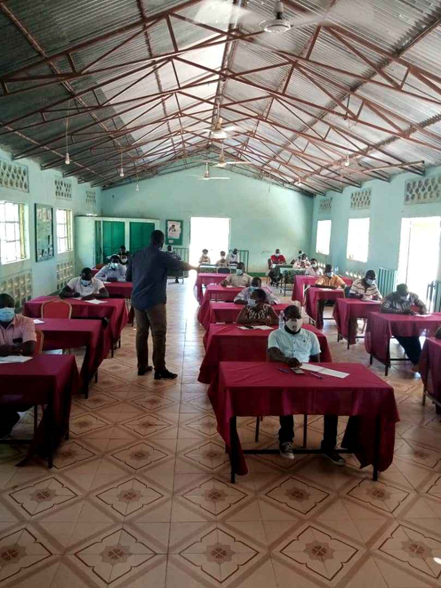
Constant Conflict Monitoring
Monitoring conflict hotspots for flare ups between warring groups, particularly over scarce resources, must be done consistently to ensure there is no ground lost on fragile peace agreements previously achieved. This new source of tension and economic distress could lead sides to revert to old, intractable and violent measures unless there is immediate response to flare-ups.
We are in constant dialogue with the leadership of Shalom Peacebuilding groups and other local duty bearers in 26 project locations in both Northern Kenya and urban environments. We have given them mentorship and guidance on how to effectively mobilize themselves at this time in order to resolve overt conflicts that have flared up or prevent latent conflicts.
Community awareness and mobilization
Shalom-SCCRR influencers – mainly chiefs, religious leaders, village elders, women, youth/warriors leaders and Community Health Volunteers – have been actively involved in collaboration efforts with local government leaders and sub-county government officials in the fight against coronavirus.
Door-to-door community awareness initiatives by Shalom-SCCRR resource people have helped enhance awareness of the virus and techniques of preventing its spread.
North Kenyan community members have praised youth leaders in Shalom-SCCRR groups for reaching out to traditional warriors in the villages, and supporting translation activities for health officers while delivering the health related messages to communities.
Community-driven action
Shalom group members in Kisumu/Nandi border and Molo/Kuresoi areas have taken an active role in protecting their communities.
“Through the estate committees (locally known as Nyumba Kumi), Shalom-SCCRR groups have been monitoring the movements of visitors to their villages and neighborhoods, and ensuring the 14-day isolation period as a precautionary measure,” says Clarice M., a woman leader from Muhoroni in Kisumu/Nandi border. “We do this with a lot of commitment in order to avoid any possible community infections from visitors.”
The safety of motorcycle transportation (locally known as boda boda) in Kenya’s urban and pastoralist environments is an issue. Shalom-SCCRR groups are helping ensure that boda boda drivers transport only one passenger at a time, and that both driver and passenger are wearing face masks.
THE EVOLVING CHALLENGES AHEAD
The emergence of coronavirus infections in Kenya significantly changed the way people live their lives. In the wake of this pandemic, the government issued a raft of globally approved measures designed to protect Kenyan residents from occasions that could expose them to infections. Some of these measures force potentially life-threatening decisions for people in Kenya on whether to adhere to the preventive measures or continue their normal way of life intent on survival.
With these realities hitting hard on the communities that have for years been beneficiaries of Shalom-SCCRR’s peace and development support, our project team mobilized to keep communities updated on coronavirus information. Moreover, Shalom is encouraging them to utilize established structures for peace building and development to effect further interventions.
The Shalom-SCCRR project team communicates frequently with the established project support groups to establish:
- The prevailing psycho-social and economic effects of coronavirus on the people’s livelihood and wellbeing.
- Level of people’s response and adherence to the advised preventive measures.
- Level of information access about coronavirus among communities.
- Support mechanisms for Shalom-SCCRR’s peacebuilding groups in local preventive initiatives.
- Immediate or intermediate conflict intervention mechanisms that communities can use to mitigate conflicts associated with coronavirus and related societal factors.
Over the past weeks, the Shalom-SCCRR team has kept in contact with 93 community leaders drawn from its seven conflict prone project regions in both Northern Kenya and poverty stricken urban environments. What follow gives insights into the experiences of the communities in the regions that are supported by Shalom-SCCRR.
Preventive measures undertaken in communities
Coronavirus initially was perceived by most Kenyans as a foreign health challenge. Consequently, majority of Kenyans especially those in the pastoralist areas were least concerned that it would hit the country. However, with the first reported case on 13th March 2020 and the subsequent gradual rise in the number of infections in the country, people have slowly become aware that the pandemic is non-discriminate and taking preventive measures is important.
With heightened community awareness campaigns, communities in Shalom-SCCRR project areas are slowly adopting measures aimed at curbing the infections and spread of the virus. In pastoralist communities in Northern Kenya, where COVID-19 is still seen as an urban disease, people have reduced travel to town centers and other villages, and they are minimizing public gatherings. In urban settings, especially informal settlements, people have widely adopted wearing face masks, avoiding handshakes and hand washing. The result is minimized community-based infection.
Preventive measure adherence challenges
Despite the visible awareness among a majority of community members about advised precautionary measures, there are serious adherence challenges that pose a threat to already vulnerable communities.
Due to high levels of poverty, basic hygiene practices like hand washing is a challenge since families give priority to food rather than soap. Access to clean water and hand washing equipment remains quite a challenge among pastoralist and urban populations.
In pastoralist villages, handshake greetings and attending community meetings are central to the people’s way of life. With these two practices being proscribed, traditional communities have found it quite challenging to implement precautions against the virus.
In informal urban settlements, social distancing is near impossible due to congestion and constrained spaces. Single and often poorly ventilated room dwellings are typically shared by about 5 family members on average. Moreover, people must queue to use shared toilets, draw water from common taps, and walk crowded, narrow lanes. Neither adults nor children stay in these small dwellings by day, and they freely interact with other people in the slums, seeding community transmission.
Slum dwellers face daily survival challenges – they don’t typically have savings and can’t stock food supplies for the family, so they must go out daily to seek work to earn money for the day’s subsistence. Sadly, they have two poor options: stay home and suffer starvation, or go out and possibly contract COVID-19 and agonize its deadly effects.
Addressing this challenge, Anne N., a resident of Nairobi’s Kibera slum and member of the Shalom group, observes,
“In order to live in this environment, it’s almost impossible to avoid interacting. We have to queue to use shared toilets and draw water from common taps. With the high population here, we can’t avoid each other because we have to walk past each other in the narrow lanes. We live in poorly drained environments, poorly ventilated rooms and typically overcrowded dwellings. The characteristics of the slum environment like Kibera are themselves potential exposures to the spread of coronavirus.”
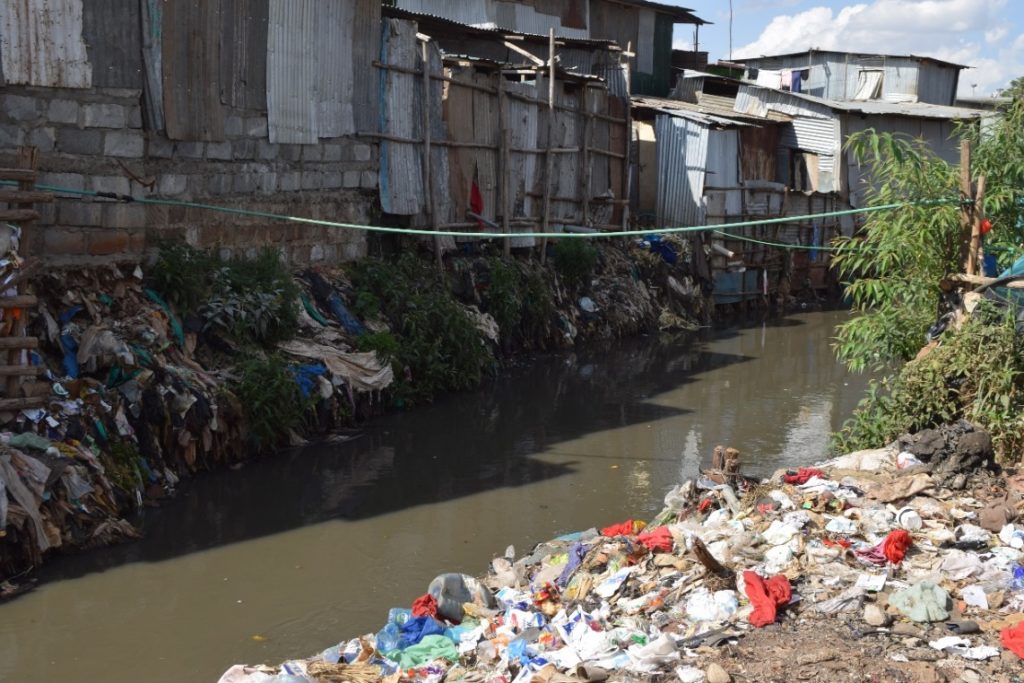
Economic impact on pastoralist areas
The economic downturn brought about by the coronavirus has hit women the hardest in pastoralist communities since a majority of families depend on women to run small business enterprises to take care of the family’s food, while men move from place to place to graze and water the livestock.
Rael K., a peace stakeholder from Archer’s Post in Samburu County, observes, “Our women are overstretched and feeling troubled – some are already empty handed with nothing to feed their children. If the coronavirus continues for long, reviving our businesses will be very difficult. We fear that our children will die of hunger, and those who survive will have to drop out of school.”
Restrictions on public gatherings and reduced inter-county movements have led to the closure of most livestock markets. The main buyers of livestock in these markets originate from Nairobi and other major towns in Kenya. The pastoralists heavily depend on these to sell their livestock and earn their livelihood. They risk malnutrition and possibly starvation due to soaring poverty and the inability to buy food. The situation is compounded by price rises for goods that must come from outlying counties.
Economic impact on informal urban settlements
Most urban dwellers in informal settlements where Shalom-SCCRR works have lost access to work as businesses shut down or underperform following stringent guidelines on social behavior and reduced working hours.
Communities are experiencing low circulation of money, increased prices of basic commodities, and widespread business closures. A large number of small- and medium-size enterprises have remained shut since mid-March 2020.
The flower firms – which for ages have offered a wide range of employment opportunities for people in the Molo/Kuresoi region of Nakuru County – have furloughed nearly 80 percent of their employees.
Employees in the hard-hit hospitality industry have mostly been laid off. According to the Kenyan National Bureau of Statistics, the hospitality industry accounted for about nine percent of total formal employment in 2017. Tourism and hospitality sectors sustain a host of other industries and services, so the economic impact of these closures is exponential.
Inter-ethnic conflict impact on pastoralist areas
On one hand, confining pastoralist residents to their villages minimizes interaction, hence reducing triggers for inter-ethnic conflicts. On the other hand, the closure of livestock markets and the increased prices of basic commodities have already led to a rise in robberies and banditry, especially at homes and along major roads as everyone strives to survive in whichever way possible.
Many fear that increasing poverty levels will lead to the resurgence of inter-ethnic conflicts as a result of livestock theft and land invasions even in those places that had previously made significant strides in the attainment of peace.
Inter-ethnic conflict impact on informal urban settlements
Urban conflict and insecurity is historically associated with heightened political activity and economic deprivation, and Kenya is entering a period of both situations at once. There is a notable rise in cases of mugging and theft since even the manual jobs performed by informal settlers are now gone.
The current reduction in political activity following the postponement of all political gatherings/events has helped slow down inter-ethnic tensions. But when political campaign activities resume in the run up to 2022 general elections, young people may be easily lured to support rich politicians who use money to rile up conflicts along ethnic and political party lines. Residents fear that inter-ethnic conflicts will rise with this combined threat.
More support is needed…
Even though there is generally a notable increase in the number of people who are doing their best to follow preventive guidelines, adherence is better in urban settings than in pastoralist areas of Kenya. Many of the people living in remote areas of Northern Kenya are not yet well informed about the virus, and believe it is a city disease that will not affect them. With only minimal cases of virus infection reported in the Northern Kenya counties, there is an urgent need to intensify awareness as there is a high risk that the number of infections will increase.
The implementation of door-to-door awareness initiatives has posed risks to the volunteers. In order to improve on the safety of the resource people involved in the awareness campaigns, Shalom-SCCRR continues to provide face masks, gloves and hand sanitizers.
The fragility of the livelihoods of the tribal communities that live in Shalom-SCCRR project areas has a negative bearing on the recovery of these communities following the ravaging effects of the coronavirus. Soaring levels of deprivation, increased property theft, and heightened competition over available resources will likely destabilize established inter-ethnic relations and possibly lead to attacks.
Through Shalom-SCCRR’s conflict intervention methodology, the team has put in place a spirited effort to constantly monitor how the pandemic is impacting relationships among ethnic groups in the Northern Kenya and informal urban environments. The goal is to organize communities in a timely manner to mitigate circumstances that could escalate into deadly conflicts.
Shalom-SCCRR stays in close contact with the communities in which they work, listening to the residents’ fears and aspirations. The organization’s mission is to help strengthen their capacity to solve emerging conflicts, build united fronts to re-ignite local development, and safeguard the threatened inter-ethnic cohesion. Shalom-SCCRR’s peacebuilding and development support has never been so critically needed as in this moment of crisis for humanity.
By:
Godfrey Okoth, MA: Director of Programs

